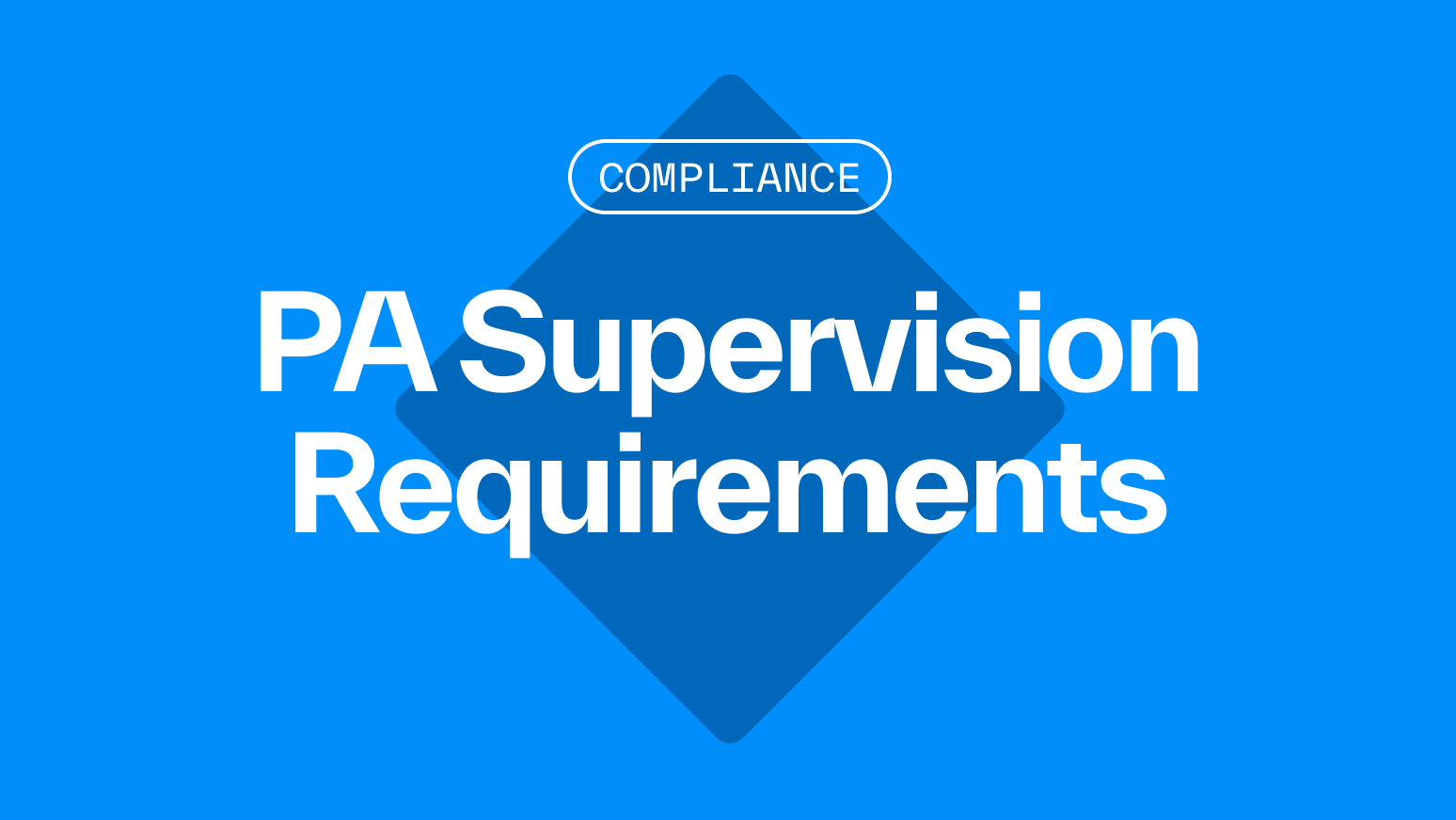
A physician assistant (PA) is a licensed clinician with an advanced degree and the ability to provide direct patient care. Physician assistants (PAs) must adhere to certain regulations and requirements, including supervision by a licensed physician.
In this post, we discuss supervising physician requirements for physician assistants and provide a guide for understanding and meeting these requirements.
What Is Physician Assistant Supervision?
Physician assistant supervision is a legal requirement that ensures the safety and quality of patient care. It is the responsibility of the supervising physician to oversee and direct the work of the PA, including making medical decisions and providing guidance and support.
The level of supervision required for a PA may vary depending on state laws and regulations, as well as the specific practice setting.
In some cases, a PA may work under the direct supervision of a physician, meaning the physician must be physically present in the same location as the PA. In other cases, a PA may work under general supervision, meaning the physician is available for consultation but does not need to be physically present.
What Are the Requirements for Physician Assistant Supervision?
The requirements for physician assistant supervision may vary depending on the state in which you practice. However, there are some common requirements that most states have in place.
Let’s dive into these requirements.

A Written Supervision Agreement
One of the most important requirements for physician assistant supervision is a written agreement between the PA and the supervising physician.
This vital document serves as a framework that outlines the respective responsibilities and expectations of both parties involved in the supervision process, and it is crucial that both the PA and the supervising physician carefully review and sign this agreement to indicate their understanding and acceptance of its terms.
Within the written agreement, it is imperative to include specific details pertaining to the scope of practice for the PA. This involves defining the specific tasks, procedures, and medical activities that the PA is authorized and qualified to perform.
Additionally, the agreement should clearly articulate the level of supervision required for the PA, taking into consideration the PA’s experience, competency, and the specific requirements set forth by the state regulations.
Furthermore, the written agreement should provide explicit guidelines on the process for communication and consultation between the PA and the supervising physician. It is essential to establish clear channels of communication and define the expectations regarding the frequency and method of communication.
The written agreement helps to ensure that both the PA and the supervising physician have a shared understanding of how and when they should communicate with each other, promoting effective collaboration and coordination in the delivery of patient care.
Zivian Health helps you find a supervising physician and issues the written supervision agreement.
Regular Communication and Consultation
Effective communication and consultation between the PA and the supervising physician are essential for providing quality patient care. The written agreement should outline the process for regular communication and consultation, including how often it should occur and the preferred method of communication.
The Zivian platform provides a central location for communication with your supervising physician, housing all required documentation and creating an audit trail for the relationship history.
On-Site Visits
In some states, on-site visits by the supervising physician are required for physician assistant supervision. These visits allow the supervising physician to observe the PA’s work and provide feedback and guidance.
The frequency of on-site visits may vary depending on state regulations and the specific practice setting.
Physician Oversight of Medical Decisions
The supervising physician holds the ultimate responsibility for all medical decisions made by the PA. This includes the review and approval of treatment plans, the prescription of medications, and the ordering of diagnostic tests.
The supervising physician must be readily available for consultation and be prepared to offer guidance and support whenever needed, ensuring that the PA has access to appropriate resources and assistance in delivering optimal patient care.

How Can Physician Assistants Meet Supervision Requirements?
As a physician assistant, it is your responsibility to ensure that you are meeting all supervision requirements.
Here are some steps you can take to meet these requirements and maintain a successful working relationship with your supervising physician.
Understand State Regulations
The first step in meeting supervision requirements is to understand the regulations in your state. Each state has its own laws and regulations regarding physician assistant supervision, so it is important to familiarize yourself with these regulations and ensure that you are meeting all requirements.
Establish a Good Working Relationship with Your Supervising Physician
Effective communication and a good working relationship with your supervising physician are essential for meeting supervision requirements. Take the time to get to know your supervising physician and establish a rapport.
This will make it easier to communicate and consult with them when needed.
Keep Detailed Records
It is important to keep detailed records of all patient encounters and medical decisions made by the PA. This includes documenting any consultations with the supervising physician and any changes to treatment plans.
These records can serve as evidence that you are meeting supervision requirements and providing quality patient care.
Attend Continuing Education and Training
Continuing education and training are essential for maintaining your skills and staying up-to-date with the latest medical advancements. It is also a requirement for many states for physician assistant supervision.
Make sure to attend any required training and stay current with your certifications and licenses.
Conclusion
Physician assistant supervision is an important aspect of providing quality patient care and ensuring the safety of patients.
As a PA, it is your responsibility to understand and meet all supervision requirements, including having a written agreement with your supervising physician and maintaining effective communication and consultation.
By following these guidelines, you can ensure that you are meeting all requirements and providing the best possible care to your patients.
Zivian Enables Compliant Collaborations for Physician Assistants
Zivian connects Nurse Practitioners and Physician Assistants to a team of reliable physicians to form long-term collaborations. Find a supervising physician in 7 days or less!